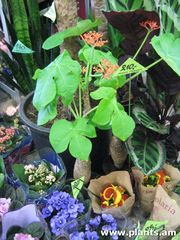Jatropha podagrica
| Jatropha podagrica subsp. var. | Buddha belly plant, gout plant, tartogo, bottleplant shrub, goutystalk nettlespurge | |||||||||||||||||||||||||||||||||||||||||||||||||||||||
|---|---|---|---|---|---|---|---|---|---|---|---|---|---|---|---|---|---|---|---|---|---|---|---|---|---|---|---|---|---|---|---|---|---|---|---|---|---|---|---|---|---|---|---|---|---|---|---|---|---|---|---|---|---|---|---|---|

|
|
| ||||||||||||||||||||||||||||||||||||||||||||||||||||||
| ||||||||||||||||||||||||||||||||||||||||||||||||||||||||
Jatropha podagrica is a species of plant known by several English names, including Buddha belly plant, gout plant, tartogo, bottleplant shrub, and goutystalk nettlespurge.
The plant can be propagated by seeds. Mature seeds can be planted in poly bags filled with a mixture of top soil, sand and well-decayed organic manure or compost. The plants can be planted in the field after four months. They can be planted in containers or can be directly planted in the field.
It is an attractive ornamental plant. It can also be used as a specimen plant. The stem swollen into vasculum at the base is a special feature of the plant. Bright red flowers are also attractive and flowers can be seen throughout the year.
| Standard Cyclopedia of Horticulture |
|---|
|
Jatropha podagrica, hook. guatemala rhubarb. Physic Nut. Tartago. Shrub, 1-2 ft. high: lvs. peltate, 3-5-lobed, 4-8 in. wide, glabrous and glaucous, lobes entire; stipules about 1/4in. long; petiole not glandular: petals scarlet; ovary glabrous. Cent. Amer.
|
Cultivation
Propagation
Pests and diseases
Varieties
Gallery
-
photo 1
-
photo 2
-
photo 3
References
- Standard Cyclopedia of Horticulture, by L. H. Bailey, MacMillan Co., 1963
External links
- w:Jatropha podagrica. Some of the material on this page may be from Wikipedia, under the Creative Commons license.
- Jatropha podagrica QR Code (Size 50, 100, 200, 500)
